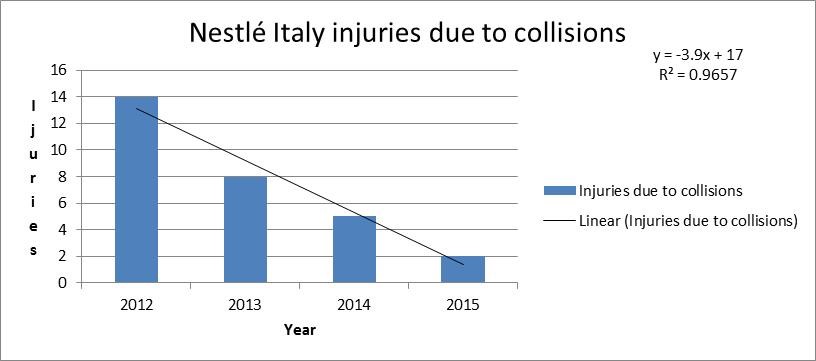Case Study
Nestlé Italy
A Culture of Safety
Nestlé has made the culture of safety a strategic choice, by constantly investing in a careful training policy for its people
Background
In 2012, the company started a program in Italy focusing on road safety, in a context where Italy holds one of the highest road fatality rates in the EU: in 2013 alone, more than 3,750 road deaths occurred, for a total of 3.1 deaths per 100,000 people. Furthermore, 2014 national statistics (source: INAIL report ‘Analisi della numerosità degli infortuni’, 2014) show that the most common cause of fatal accidents during work hours in Italy is related to the use of vehicles:
- 14% of accidents during work hours involve vehicles used during work hours for commuting and/or business purposes while 41% were fatal
- Commuting alone represents 11% of all occupational road accidents and 24% of fatal accidents
The Nestlé program, which involved employees from different divisions and positions, includes both training courses and practical activities. Also, as a result of this program, ad hoc collision reports have been implemented to analyze risks; safe driving awareness programs aimed at spreading the culture of road safety and practical courses in specific areas, such as replacing tires, have been undertaken.
Transforming work-related road safety
All Nestlé workers in Italy who require a company vehicle receive training which includes:
- The company’s policy, rules and procedures
- Layout of workplace traffic routes
- How to report vehicle faults or work hazards
- What to do in the event of a collision, breakdown or emergency
- Information about site-specific dangers, speed limits, parking and loading areas
Virtual Risk Manager (VRM) is a long-term safe driving program to create a culture of road safety, supported by intranet tools that allow drivers to access and complete the stages of the program.
The program is structured in different stages, which from October 2012 to December 2016 have included:
Risk Foundation: policy and pledge signature
RoadRISK: driver profiling, evaluation and feedback on drivers, vehicles and trip risk exposures
RiskCOACH: Attitude: best practice awareness training:
- RiskCOACH: Driving while distracted
- RiskCOACH: Avoiding rear-end collisions
- RiskCOACH: Eco-friendly driving
In order to assess risks, Nestlé examined several factors: average mileage, collision data, number of driving violations and information obtained from the online form in Virtual Risk Manager completed by every driver. In particular, there is a high correlation (19%) between mileage and driving violations (speed, in particular), as well as between mileage and accidents (12%).
Vehicle features
Nestlé assigns a company car to senior managers, salespeople and employees who drive more than 20,000 km per year.
In line with company standards, all cars must have:
- Seatbelts on all seats
- Side-mounted wing mirrors on each side of the vehicle
- Tires manufactured and maintained to relevant industry standards
- Head restraints for all seats
- ABS and ESC systems
- Driver and front passenger airbags
- Front and rear fog lights (in countries where foggy conditions exist)
- Air conditioning
- At least a 4-Star NCAP (New Car Assessment Programme) rating
- Winter tires; in the case of rental vehicles, the driver should request them from rental company.
The vehicles, which have a replacement cycle of 60 months, are maintained in good condition through a combination of checks by the driver and planned maintenance by skilled technicians.
Trip management
Trip planning is regulated in the Car Policy, which includes:
- Assessment and selection of appropriate routes
- Careful scheduling of trip timing
- Assessment of weather conditions (snow, heavy rain, strong winds)
The policy also provides for considering other options, such as teleconferencing, travelling by train or plane (in cases of more than 400 km) and sharing the driving with a co-worker.
Results
Thanks to this program, road collisions involving employees over the last 4 years are moving towards zero.
Also, audits will be conducted at least every three years to identify areas of improvement; upcoming steps in the program include:
- the extension of the program to all employees on a voluntary basis
- the systematic use of VRM DriverINDEX
- further implementation of the culture of safety among all the people who work at Nestlé on a daily basis
The company’s ongoing attention to road safety is a broader expression of Nestlé’s commitment to Creating Shared Value, which means creating long-term value not only for the company, but also for the communities in which it works, starting with its employees.
![[logo]](https://www.edriving.com/wp-content/uploads/2016/10/150px_nestle.png)
